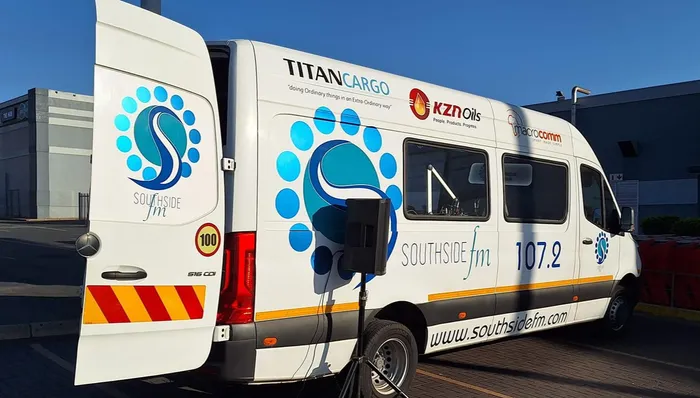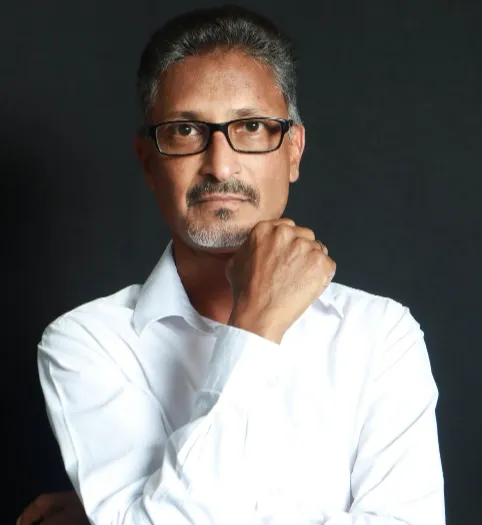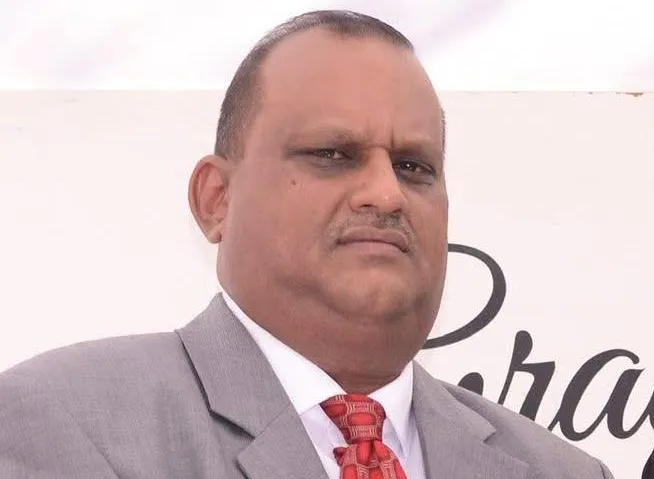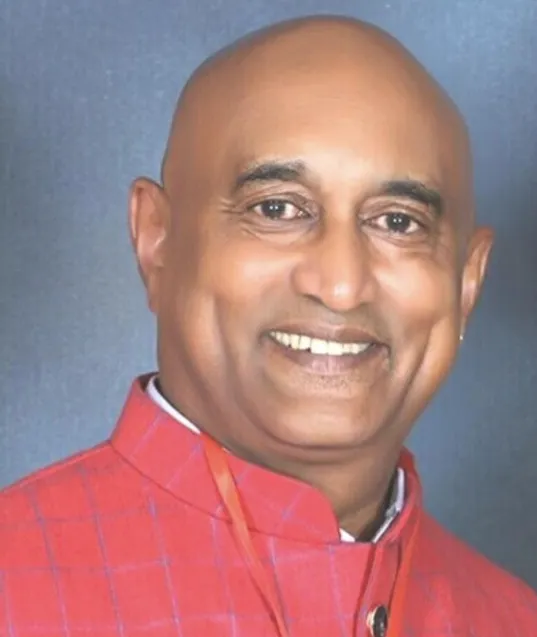
The Tamil Business Warriors purchased a Mercedes Benz Sprinter and paid for its upgrade to a mobile studio with air conditioning and a UPS System.
Image: Facebook
SOUTHSIDE FM is in a dire financial situation, with debts exceeding R3 million and a lack of audited financial statements.
The Independent Communications Authority of South Africa (Icasa) has given the station three months to comply with its licence conditions, prompting a call for community support to revive the struggling station.
This emerged at a public meeting last Sunday to address the challenges faced by the three-year-old station.
There was also a bid to garner support from the South Indian community, and local organisations and businesses.
Station manager Tansen Nepaul said Icasa had renewed the station’s licence for the next five years, and the station’s board and staff - who worked for free - were on a drive to revamp the drive-time shows and attract advertising as part of the turn-around strategy.

Tansen Nepaul.
Image: Facebook
In his report presented at the meeting, Nepaul said the station was not fully compliant with SARS which meant they were unable to do business with advertising agencies and businesses.
This, he said, cut their chances of generating revenue.
He said the station also did not have a non-profit organisation (NPO) status to apply for grants.
Nepaul, who took on the role as station manager in April 2023, said the their financial woes began a year after being in operation.
“The original board had battled to sustain the station on good financial footing. A decision was made to either shut the station down or hand it over to an interested party.
“A few proposals came through and the board saw fit to hand over the running of the station to a new board of directors who consisted mainly of members of the Tamil Business Warriors (TBW) led by Karthy Moothsamy,” said at the meeting.
He said TBW came as a lifeline ion and sustained the station for two years.
“TBW raised money by taking loans from their business partners with the intent of paying this off in two years. They acquired a property in the form of a lease agreement in Westcliff, Chatsworth, for a new studio.
“They paid for all renovations and structural changes to build an impressive studio which took about six months to complete. They purchased a Mercedes Benz Sprinter and paid for its upgrade to a mobile studio with air conditioning and a UPS System,” Nepaul said.
He said KZN Oil and Macrocom advertised their company branding on the mobile studio, which brought in a R100 000 in revenue a month.
In January 2024, the station moved into the newly renovated studios in Westcliff.
“What Southside FM achieved in a few months under the TBW board, had taken similar community radio stations at least 10 years to achieve. The board was given the impression that the mobile studio would be able to generate the revenue to pay back the loans taken from business individuals.
“This did not happen. The reliance on business partners of TBW to take on advertising at the station was aggressively approached but it unfortunately did not materialise. The advertising revenue that we did generate was not sufficient to meet the operational running costs of the station.
“Money that came in from the mobile studio sponsors was meant to pay back the loans. Instead, we had to use this money to meet the running cost of the station,” he added.
Nepaul said TBW had tried various ways to fund the station but most plans could not be implemented as they were based on commercial lines and did not meet the accepted conditions of the broadcasting regulator, as stipulated for a community radio station.
“After 18 months, the TBW members started to dip into their own pockets to sustain the station. We were never in possession of validated financials. The original board could not hand over validated financials to the TBW board even after many such requests were made.
“From all the issues faced by the previous board, the most challenging were the ones that were historically inherited and it continues until today. If there is no resolution to the issues of unvalidated financial statements and tax compliance, then we would not be able to implement any strategy to generate our income successfully,” Nepaul added.
Thanigasalan Moodley, who was elected as chairperson of the station’s board in December, said at the time they had requested the financial statements to better understand the challenges.
He said the previous board presented them with management accounts and not the audited financials.

Thanigasalan Moodley
Image: Facebook
“The management accounts revealed that TBW had put in a lot of money into the radio station. A large portion of this money was loan accounts and unpaid bills.
“We were informed that a loan amount of R4.5 million was owing to Logan Naidoo. It was converted into a donation but we have not seen any letter or undertaking confirming such,” he said.
He said due to unpaid rental, the landlord of the studio in Westcliff had demanded payment for the arrears.
“Arrears for the rental was demanded, or we faced a lockout. We appealed to the Natal Tamil Vedic Society Trust (NTVST) for the use of their premises to set up the radio station.
“In the absence of audited financials we took a decision not to take or use the assets of the station as we were not prepared to carry the debt and we believed that should we take the assets then by implication would have to take the debt,” he added.
Moodley said the financial crisis was largely because of the lack of funding which could have been attributed to the station running on a business model which had failed, a lack of community involvement, support and funding.
“The support has been inadequate for the radio station to function actively. The public meeting provided a directive that a new non-profit company would be formed and assistance and support may be solicited.
“We hold the view that the intentions of the previous boards were well-meaning and tried the corporate type approach, sparing no cost, but sadly they did not enjoy the community support.
“The situation can be turned around. We are a resilient community. We need the South Indian community to take ownership of the station and realise that it is an effective tool in culture perpetuation.
“The station needs financial contributions but residents can play their part by simply switching on the radio so that we can increase listenership and attract advertisers,” Moodley added.
Dr Raj Govender, chief executive officer of TBW, said the community had endorsed the organisations involvement in Southside FM in September 2023.

Raj Govender
Image: File
“At the time, the station faced severe financial strain, threatening its ability to continue broadcasting. TBW stepped in with the aim of implementing a sustainable business model. Its responsibilities included financial management, investor engagement, infrastructure development, and ensuring day-to-day operations.
“A state-of-the-art broadcasting studio was developed in Westcliff and a mobile studio was procured through investment from TBW members.
“The initial plan adopted a hybrid model, implementing a business funding strategy in line with investor-driven sustainability. TBW hoped that this would attract commercial sponsorships and advertising revenue. However, as financial returns did not materialise as expected, TBW shifted the model to one that was fully donor-funded and aligned with the regulatory framework set out by ICASA for community radio stations.
“Funding from TBW was in the forms of donations and loans. Individual members made donations and sponsorships to support the station operations during critical periods. We also disbursed funds - largely sourced from membership fees - for capital and operational costs in the form of loans and investments.
“These loans funded the construction and equipping of the Westcliff studio, purchase of the OB vehicle, payment of stipends to presenters and support staff, and coverage of monthly operating expenses. Due to the absence of consistent revenue streams, TBW is hopeful that it will be able to recover these loans in the near future,” Govender added.
With regard to the unaudited financial statements, Govender said TBW would only account for the period under its control.
“Unfortunately, prior financial records were not handed over, making it impossible for the auditors to produce a comprehensive audited financial report that spans the station’s entire history. TBW’s financial conduct, however, has remained transparent, with regular updates provided at community forums and radio engagements.
“The station is currently operating under severe financial constraints. To ensure survival, cost-saving measures were implemented including relocation to rent-free premises, cessation of stipends to presenters (who now volunteer), and a significant reduction in operational overheads. These decisions reflect a practical effort to preserve the station's broadcast continuity while transitioning toward a more community-driven, donor-supported model,” he said.
He said TBW strongly believed that the South Indian community had the passion and resilience to sustain the station.
“Southside FM represents the first Tamil and Telugu-focused radio station in the country and was a dream that took over 12 years to realise. With renewed community engagement, targeted donor funding, and support from advertisers and sponsors, the station can thrive.
“The new board comprises culturally-rooted and committed individuals. We appeal to the community to rally behind the station, not only by tuning in but by contributing to its sustainability. We owe it to our forebears who brought with them rich traditions and language that deserve to be preserved and broadcast to future generations,” Govender added.
- Be in compliance with technical standards of transmission
- Be in compliance with content as stipulated by its licence. For example: percentage of music over talk, minutes of news and percentage of SA music.
- Members of the board need to come from the community from its FM reach.
- A monthly report has to be submitted to the regulatory body with specific criteria to be reflected including sources of sponsorship and advertising revenue.
Related Topics: